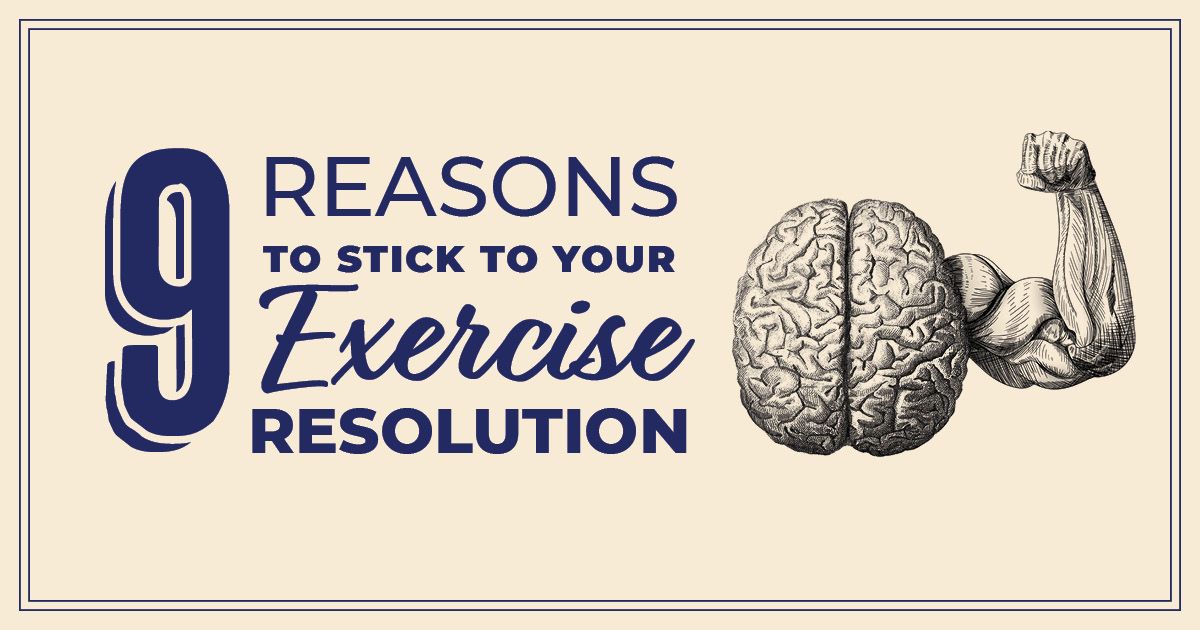Here we are again, on the verge of that annual tradition—“The Resolution.” Every year millions of us pledge on New Year’s Eve to workout and get healthier in the new year. It remains an inspiring promise to yourself if you can stick with it, and it does have very rewarding physical benefits. But, as awesome as the physical aspects can be, have you ever considered the mental payoff of a little exercise?
I changed up my workouts after the birth of my first child 17 years ago. Truth be told, it wasn’t an easy change to make. It involved copious amounts of coffee and stumbling around the gym for about a month. Anyone who has had a newborn will tell you that sleep already eludes you, so giving up what little I got seemed crazy. But after getting into a rhythm, the payoff was huge (and still is, since I managed to stick with it). Thanks to my morning workout I show up at the office to start my day sharper and more energized. In fact, several of us at LMD swear by our morning workouts. Don’t get me wrong, I do miss lazy mornings from time to time and that extra hour of sleep sounds nice but ultimately, I’m always much happier after I’ve dragged myself to the gym to exercise.
Here are nine great reasons to get up and moving before work. And if you can’t do mornings, don’t worry, the benefits remain the same for a post-work workout.
- Increased Creativity Exercise is well known for enhancing a positive mood, which can improve creative thinking. Getting up and moving can clear your head and help overcome “blocks” in everyday assignments. A mid-day walk or run may just get you going again on that project you’re stuck on. As the head of LMD’s creative team, I find this benefit vital.
- Reduced Stress Stress is pretty much a given in any job—but taking some time to yourself can help keep it in check. The more sedentary we are, the less efficient we become at managing stress. Exercise increases the production of norepinephrine, a chemical that affects the brain’s response to stress.
- Anxiety? Not Here A 5 to 10-minute vigorous walk or bike ride will do way more for you than 20 minutes in a hot tub (although a nice soaking after is enjoyable). Anxiety is a serious condition in the US that affects over 40 million adults. Psychologists studying the effects of exercise suggest that moderate activity can alleviate anxiety for up to several hours.
- Get Happy Exercise is nature’s buzz, releasing endorphins into the body that create the feeling of euphoria, and has even shown some effectiveness in people suffering from clinical depression. Studies suggest it doesn’t take a marathon to do the trick. Just 30 minutes a few times a week can enhance your overall mood.
- Get ’r Done Incorporating a regular exercise routine greatly improves one’s overall energy and productivity levels. Although I’m advocating for a morning workout to boost mental sharpness, some experts believe that midday is best keeping in tract with one’s circadian rhythms.
- Increase Your Brainpower Cardiovascular exercise—stuff that gets the heart pumping—can create new neurons (aka brain cells) and boost memory. That’s not all: A tough workout increases levels of BDNF, a brain protein that helps with decision making and higher-level thinking and learning.
- Improve the Power of You A regular exercise routine can improve your self-image and self-esteem. As the physical benefits start to show, your own confidence increases as achievements are realized.
- Zzzzzzzzzzz That’s right, better sleep. And who doesn’t want that? Decreased anxiety, stress, and depression allow the body to decompress and fall asleep more easily. In addition, studies have found that after 4 to 24 weeks of exercise, adults fell asleep faster, slept longer, and had better sleep quality.
- Say No to Mind Decline Unfortunately for me, studies show that cognitive decline begins after the age of 45. A regular workout routine, especially when started at a younger age (ideally between 25 and 45) boosts chemicals that prevent cognitive degeneration. Keep and maintain a regular exercise routine after age 45 to help keep your mind young and sharp and prevent degeneration of the hippocampus.
Most everyone can agree on the physical benefits of exercise but adding the mental aspect as part of the big picture really emphasizes the important role it plays in improving your overall health. And it doesn’t take hours at the gym–walk over to a teammate to collaborate instead of emailing or Slacking. Go for a lunchtime walk or an evening jog. Even starting with 20 minutes of movement, you’ll see the results.

